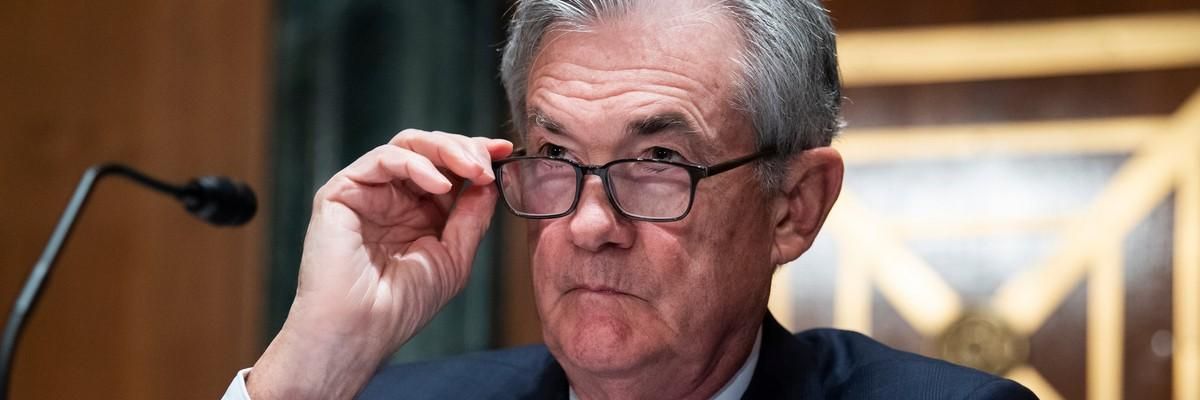

SUBSCRIBE TO OUR FREE NEWSLETTER
Daily news & progressive opinion—funded by the people, not the corporations—delivered straight to your inbox.
5
#000000
#FFFFFF
To donate by check, phone, or other method, see our More Ways to Give page.


Daily news & progressive opinion—funded by the people, not the corporations—delivered straight to your inbox.

Federal Reserve Chairman Jerome Powell testifies during a Senate hearing on July 15, 2021. (Photo: Tom Williams/CQ-Roll Call, Inc. via Getty Images)
Yesterday's data showing negative gross domestic product (GDP) growth for the second consecutive quarter has sparked a debate about whether the U.S. economy is in recession. Below are some quick thoughts interpreting the numbers, and some larger questions about recession and inflation.
A recession in the coming months would be exceptionally troubling. It would largely result from a policy mistake of too-rapid interest rate tightening by the Fed--one that could have been avoided. If a recession hits when inflation remains high--mostly driven by global developments in energy and food markets--the Fed might feel pressure to not cut rates in order to bleed remaining inflation out of the economy. This would be extremely damaging and threaten to prolong the recession.
Finally, if the wrong narrative--that today's inflation was driven by too-generous fiscal relief--takes hold, it could make it even harder for Congress to undertake necessary recovery measures. In short, the inflationary episode we're in could induce political hesitancy to address a future recession, and that could end up being inflation's greatest cost to U.S. households.
Trump and Musk are on an unconstitutional rampage, aiming for virtually every corner of the federal government. These two right-wing billionaires are targeting nurses, scientists, teachers, daycare providers, judges, veterans, air traffic controllers, and nuclear safety inspectors. No one is safe. The food stamps program, Social Security, Medicare, and Medicaid are next. It’s an unprecedented disaster and a five-alarm fire, but there will be a reckoning. The people did not vote for this. The American people do not want this dystopian hellscape that hides behind claims of “efficiency.” Still, in reality, it is all a giveaway to corporate interests and the libertarian dreams of far-right oligarchs like Musk. Common Dreams is playing a vital role by reporting day and night on this orgy of corruption and greed, as well as what everyday people can do to organize and fight back. As a people-powered nonprofit news outlet, we cover issues the corporate media never will, but we can only continue with our readers’ support. |
Yesterday's data showing negative gross domestic product (GDP) growth for the second consecutive quarter has sparked a debate about whether the U.S. economy is in recession. Below are some quick thoughts interpreting the numbers, and some larger questions about recession and inflation.
A recession in the coming months would be exceptionally troubling. It would largely result from a policy mistake of too-rapid interest rate tightening by the Fed--one that could have been avoided. If a recession hits when inflation remains high--mostly driven by global developments in energy and food markets--the Fed might feel pressure to not cut rates in order to bleed remaining inflation out of the economy. This would be extremely damaging and threaten to prolong the recession.
Finally, if the wrong narrative--that today's inflation was driven by too-generous fiscal relief--takes hold, it could make it even harder for Congress to undertake necessary recovery measures. In short, the inflationary episode we're in could induce political hesitancy to address a future recession, and that could end up being inflation's greatest cost to U.S. households.
Yesterday's data showing negative gross domestic product (GDP) growth for the second consecutive quarter has sparked a debate about whether the U.S. economy is in recession. Below are some quick thoughts interpreting the numbers, and some larger questions about recession and inflation.
A recession in the coming months would be exceptionally troubling. It would largely result from a policy mistake of too-rapid interest rate tightening by the Fed--one that could have been avoided. If a recession hits when inflation remains high--mostly driven by global developments in energy and food markets--the Fed might feel pressure to not cut rates in order to bleed remaining inflation out of the economy. This would be extremely damaging and threaten to prolong the recession.
Finally, if the wrong narrative--that today's inflation was driven by too-generous fiscal relief--takes hold, it could make it even harder for Congress to undertake necessary recovery measures. In short, the inflationary episode we're in could induce political hesitancy to address a future recession, and that could end up being inflation's greatest cost to U.S. households.